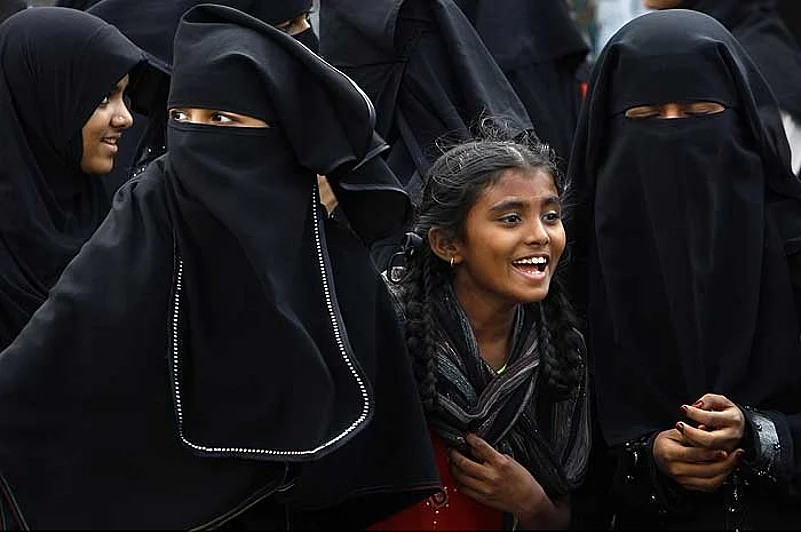Two other girls, Qainat and Shaziya, were shot by the Talibans along with Malala Yousufzai on their way to school. They too were rushed to London for treatment. Today they live in London; they dress and travel as they wish too. Their unfettered spirit soars high in the sky, as high as they want it to be. When the orthodoxy questions them on their lipsticks and their nail-polishes, they retort back: Why not? Why should we not live our own lives? Why cannot we enjoy like the ‘other’ girls?
Muslim women in India right now are asking the same questions: Why cannot we live on our own terms? Why cannot we be treated like the other Indian women? Why does orthodoxy, or patriarchy for that matter, have to invade the ‘public’ space of constitutional and Human Rights (refer to Art 16(1) of the Universal Declaration) in the name of protecting religious interests?
The All India Muslim Personal Law Board tried to argue its case in the affidavit filed in the Supreme Court. The crux of it was that Muslim women should not ask for a legal procedure of divorce or even for alimony, as it would endanger their lives.
A lengthy legal procedure of divorce in the Court would endanger their lives, the affidavit stated. It further added that if a Muslim woman drew the matter of her divorce to the court, the aggrieved husband would defame her in public and this be-izzati (insult) would preclude the chances of her remarriage. Most importantly, the Muslim Personal Law Board regarded that in any matter of conjugal discord leading to a possibility of talaq, the decision of the man was final!
The law Board thus successfully went farther ahead of the present US President in misogynist statements.
I have just returned from Colombo after attending a world conference on Women’s Studies. This island-State has a Muslim population of 9.2 percent. But Sri Lanka could ensure that Muslim talaqs were legally processed and every single instance registered before a qazi and two witnesses. I say this for some people in India who argue that the preservation of the right of triple talaq ensure the protection of Minority Rights for Muslims.
Actually, the Muslim patriarchy in India has consistently opposed any reform that concerns women. Their allegiance to the Sharia, however, does not deter them from taking the advantage of the criminal laws in the Country. Mutilation of limbs is the punishment prescribed for theft in Islamic Law! They also do open accounts in normal banks and enjoy the ‘interests’ offered therein. Interests again, are haramin Islam! If they are indeed so particular on preserving the puritanist ideals and refuse to move with time, why do they use modern technology and upload pictures in the social media?
All these suit the patriarchy perfectly well. Only when women seek their legitimate rights in divorce, maintenance and inheritance, they become very religious and raise the slogan, “Islam Khatre me hai!(Islam is in danger)”
When we launched the campaign against triple talaq and our campaign gradually started gaining momentum, the AIMPLB during its 25th Annual General Meeting held in Kolkata (November 2016), Challenged us and contested our faith in Islam.
In a press conference that followed, we asked if they believed in the Indian Constitution, or held the passports of Saudi Arabia? The extra-territorial loyalty of the Muslim orthodoxy and its persistent propagation of the theory of an Islamic Utopia have always intrigued me.
In a humble reminder to the orthodoxy in that Press Conference, I stated that my family originally hails from Bukhara, currently in Uzbekistan. Years ago, my ancestors had migrated to this unique land and decided to stay here. I do also know about Islam and have some ‘little knowledge’ about Islamic jurisprudence. This family of mine had decided to stay in a remote hamlet in Birbhum, West Bengal, a place not very far from Tagore’s Santiniketan or our President, Pranab Mukherjee ancestral village.
Our family of Pir-s had decided to stay there because they did not believe that Muslims should have a separate homeland; they did not subscribe to the Two-Nation Theory.
My grandfather, who participated in the Indian freedom struggle and later became a lawyer, taught me two important things. One, he would almost incessantly chant in my ears, Ilm hasil karo (obtain knowledge!). He also taught me to have the greatest faith in the Indian Constitution. Religion, for him, was an intimately private affair to connect with the sublime. I believed him. I have been a teacher for the last two decades and I have tried to pass on these ideals to the next generation of Muslims.
Muslim women must enjoy the same legal rights as women of the other communities in India. Otherwise, gender equality will remain an elusive goal.
I am looking up to the final verdict from the Constitutional Bench with great hope, with Shayara Bano of Uttarkhand, Afreen Rahman of Indore, Shumayla Javed of Amroha, UP, and many others, men and women, Muslim and non-Muslim.
It is not just the nation...the world today wants to know, if India can live up to the challenge.
(Syed Tanveer Nasreen is Professor, Department of History, HoD, Women’s Studies, Burdwan University, West Bengal and a Women’s rights activist)
















